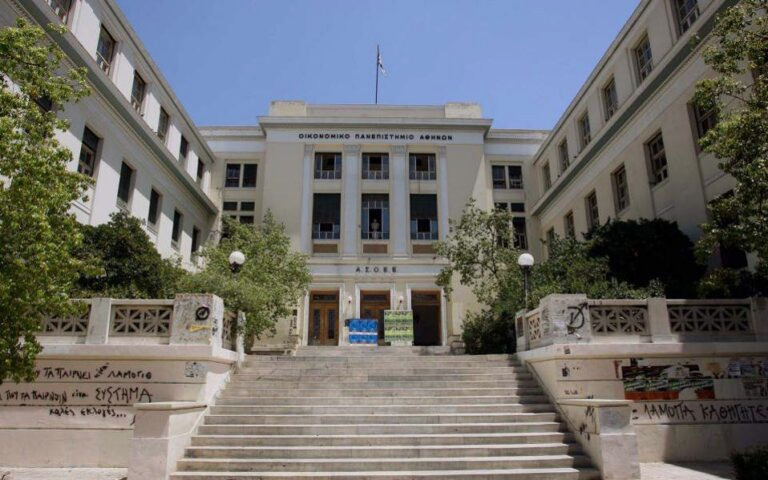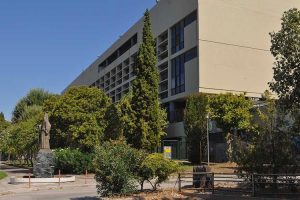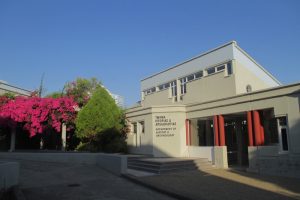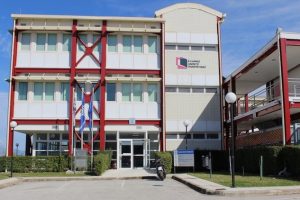
University of Thrace Greece
The University of Thrace, officially known as Democritus University of Thrace (DUTH), is a public university in northeastern Greece. It was founded in 1973 by a Greek government decree.
The university was named after Democritus, the ancient Greek philosopher often considered the father of atomic theory. This name reflects the university’s focus on promoting scientific and academic excellence, especially in engineering, natural sciences, and philosophy.
The establishment of the university in the Thrace region had a transformative impact on the area. Not only did it provide higher education opportunities for local students, but it also contributed to the economic and cultural development of the region.
The university became a major employer, a hub for scientific research, and an important center for innovation. Its graduates have gone on to occupy key positions in various sectors across Greece and internationally.

Research
The University of Thrace Greece hosts several research centers and institutes dedicated to specific fields, promoting collaboration among faculty and students. These centers often participate in national and international research projects. it has has been a core element of its mission since its establishment, helping the university gain recognition not only in Greece but also internationally. Over the years, the university has developed a strong research culture, with a focus on scientific excellence and innovation. It has become a hub for research, particularly in areas such as engineering, medicine, agriculture, and natural sciences, while also expanding its research output in fields like social sciences, humanities, and business
Research Areas
Engineering and Technology
Research in areas such as civil, electrical, and computer engineering.
Innovations in renewable energy, smart systems, and materials science.
Health Sciences:
Focus on medical research, public health, and pharmaceutical studies.
Collaborations with hospitals and health institutions for clinical research.
Social Sciences and Humanities:
Studies in sociology, psychology, and education.
Research projects addressing societal issues and cultural studies.
Natural Sciences:
Research in physics, chemistry, and biology.
Emphasis on environmental studies and sustainable practices.
Their faculties offer a wide range of disciplines, including engineering, social sciences, humanities, and health sciences
| Faculties |
|---|
| Faculty of Social Sciences |
| Faculty of Sciences |
| Faculty of Medicine |
| School of Sciences and Technology |
| Faculty of Engineering |
| Law |
Campus and Facilities
The university has several campuses, each equipped with various facilities to support student learning, research, and community engagement.
Xanthi Campus
Home to the Faculty of Engineering and the Faculty of Economics and Business.
Modern lecture halls, laboratories, and research centers. The campus also features libraries and study spaces.
Komotini Campus
Hosts the Faculty of Social Sciences and Humanities, as well as the Faculty of Health Sciences.Equipped with advanced medical training facilities, laboratories, and a well-resourced library. The campus also offers recreational areas.
Alexandroupolis Campus
Includes the Faculty of Fisheries and the Faculty of Environmental Sciences.
Research labs, marine research facilities, and spaces for environmental studies. This campus is particularly focused on practical applications related to the sea and environment.
General Facilities
Libraries
Each campus has a library with extensive collections of books, journals, and digital resources. They provide study areas and access to academic research databases.
Laboratories
The university features specialized laboratories for various disciplines, including engineering, health sciences, and natural sciences, equipped with modern technology.
Sports Facilities
The university promotes physical activity and offers sports facilities such as gyms, sports fields, and courts for various sports.
Cafeterias and Dining Halls: Each campus has dining options that provide meals and snacks for students and staff.
Student Services
DUTH offers various services, including counseling, academic advising, and career services, to support students’ academic and personal development.
Housing
The university provides accommodation options for students, including dormitories and student residences close to the campuses.
Courses Offered in English
The University of Thrace offers a range of courses in English, particularly at the postgraduate (Master’s and PhD) levels, to attract international students and foster global academic collaborations. While the primary language of instruction for undergraduate programs is Greek, the university recognizes the growing demand for English-language courses, especially in fields like engineering, medicine, business, and social sciences.
| Courses in English | Bachelor | Masters | PHD |
|---|---|---|---|
| Computer Science and Engineering | BSC | MSC | PHD |
| Electrical and Computer Engineering | BSC | MSC | PHD |
| Humanities & Social Sciences | BSC | MSC | PHD |
| Law & Political Science | – | MSC | PHD |
| Pharmaceutical Sciences | – | MSC | PHD |
| Public Health | – | MSC | PHD |
| Business and Economics | – | MSC | PHD |
| Data management and Machine learning, | – | MSC | PHD |
| Software engineering and Artificial intelligence/td> | BSC | MSC | PHD |
| Informatics | BSC | MSC | PHD |
The admission requirements for international students applying to graduate programs (Master’s and Ph.D.) at Democritus University of Thrace (DUTH) generally include academic qualifications, language proficiency, and other documentation.
Bachelor’s Degree (for Master’s Programs)
Applicants must hold a Bachelor’s degree (or equivalent) from an accredited university or higher education institution.
The degree should be relevant to the program for which you are applying (e.g., a degree in engineering for an engineering-related program or a degree in business for business-related programs).
Language Proficiency
Since many graduate programs are taught in English, non-native English speakers must demonstrate proficiency in the English language.
Accepted language proficiency tests and minimum scores
TOEFL
(Test of English as a Foreign Language): Minimum score of iBT 80 or PBT 550.
IELTS
(International English Language Testing System): Minimum score of 6.5.
Cambridge English Proficiency (CPE) or Cambridge English Advanced (CAE)
Minimum score of C1.
Some programs may accept other forms of proof of English proficiency, such as an undergraduate degree completed in English or a letter from your previous institution confirming English as the language of instruction.
Academic Transcripts and Certificates
Official transcripts of your undergraduate studies, showing the courses you have completed and the grades you have achieved.
Degree certificate or a letter from your university confirming the expected date of graduation (if you have not yet completed your studies).
Curriculum Vitae (CV)
A detailed CV or resume outlining your academic background, work experience, research, and any extracurricular activities or accomplishments that are relevant to the program you are applying to.
Motivation Letter or Statement of Purpose
A personal statement or motivation letter explaining why you are interested in the program, how it fits with your academic and career goals, and why you have chosen Democritus University of Thrace. This is an important part of your application as it helps the admissions committee understand your motivations and goals.
Letters of Recommendation
Typically, two or three letters of recommendation from academic or professional references who can speak to your qualifications, character, and potential for success in the program. Ideally, These should come from professors or supervisors familiar with your academic work or professional experience.
Research Proposal (for PhD Applicants)
PhD applicants are often required to submit a research proposal outlining their intended area of research, research questions, objectives, and methodology. This will be evaluated to assess the feasibility and alignment of your research interests with the faculty expertise at the university.
Portfolio (if applicable)
For certain programs, such as those in the arts or design-related fields, you may be required to submit a portfolio showcasing your previous work or creative projects.
ljslaJLKJDLKajdlkajLKDJLKAjdlkAJLAKAKL
You may also like

Aristotle University of Thessaloniki Greece

University of Crete Greece

